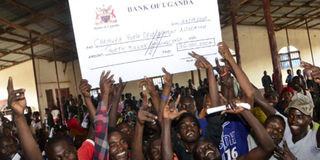Opportunities, challenges in the scramble for Buganda’s millennials

Beyond Uganda, how are the youth prepared to play a transformative role for our country - situated in a skewed global order that keeps Africa on the margins? FILE PHOTO
As the US celebrated its Memorial Day on Monday, more than 500 Baganda congregated in Washington to attend the increasingly popular Buganda Bumu North American Convention (BBNAC) 2019 under the banner “Buganda: Our youth our future’.
In a message to BBNAC, Kabaka Muwenda Mutebi stressed the centrality of and promise the youth (aged 16 to 35) hold for Buganda’s future. He stressed the need for the youth to be grounded in Kiganda culture, language and norms.
Both the conference theme and the Kabaka’s message, premised on Uganda’s largely youthful population (diaspora and home), beg fundamental questions about its youth and the kingdom’s future.
Prominent among these are: how is this generation equipped to confront Uganda problematic political, economic and environmental challenges? To what extent do they understand the ‘Buganda question’ and how it may be resolved in Uganda’s politics - typified by greed self-promotion and self-preservation?
Also, beyond Uganda, how are they prepared to play a transformative role for our country - situated in a skewed global order that keeps Africa on the margins?
Additionally, our country is riddled with severe environmental challenges, how can they be the change “they want to see” as we consider our very dependence on natural resources? In his keynote address, Katikkiro Charles Peter Mayiga canvassed some of these issues.
Clearly, the BBNAC theme was timely and I regret that there wasn’t enough time and discourse on the cruciality of youth mobilisation in Buganda or abroad.
This reality underscores the challenge we face in preparing the youth to embark on the job of transforming, advancing and protecting Buganda’s socioeconomic, political and environmental interests in today’s Uganda.
Yet, as BBNAC convened in Washington, in Uganda the mobilisation of the youth by political actors continued in high gear ahead of the 2021 elections. The prize is known. For President Museveni, currently handing out billions of shillings on a countrywide wealth creation tour, the goal is to target the youth to keep him, and the NRM, in power.
For the Opposition, mostly under MP Robert Kyagulanyi, aka Bobbi Wine, the goal is to mobilise and appeal to the youth to help him take and keep power. Given the upheavals and developments in Egypt, Sudan and South Africa this class understand too well the potency of the youth in political parlance.
For Buganda, the goal for the mobilisation of the youth needs to be clearer. As we know, because it is locked up in a political and legal straight jacket that forbids it to advance its interests beyond tradition and culture, it is not always easy for it to mobilise its youth without attracting controversy. And yet herein lies a window of opportunity considering the incredible contribution Baganda youths are making in various sectors at home and abroad. Bringing a different sense of innovation, thought process and a daring approach.
Without the billions to hand-out to the mostly penurious youth or the captive songs to energise and drum up its youth, Buganda needs to be creative and proactive to capture the attention and imagination of its youth. These cannot be taken for granted.
The question is, how does it reenergise, stimulate and utilise youth associations (Nkoba za Mbogo, Kezimbira, Nkeletanyi, Buganda Youth Council, and others) to connect with its broad youthful population - including the women, the diaspora, the unemployed, the employed, the professionals, politicians and its business men and women?
BBNAC, and youth-focused conferences like it, offers a good starting point and certainly an opportunity at this pivotal point of our history. And, given that the kingdom envisions a future erected upon and driven by its youthful generation, then more work needs to done to recruit, build networks, train (leadership), empower, innovate, provide opportunities and constantly engage its youthful population about its interests and goals.
Additionally, in an increasingly digitised world and on a continent [Africa] whose use of digital space has reached seismic proportions, it will be necessary to identify the key factors that affect this number as well as to better understand their worldview and priorities.
The digital space also provides a window of opportunity for continued engagement with youth – home and abroad – as BBNAC journeys towards its next conference in Chicago.
The scramble for and aggressive political agendas targeting the youth at home suggests that Buganda’s work in developing an impactful youth-focused and youth-driven agenda is clearly cut out.
There are many in-between opportunities that we can engage in to connect both youth in diaspora and Buganda so no time is lost. Let’s not wait for BBNAC in 2021 to get on with this wildly important job.
The writer is a lawyer and
senior advisor to Kabaka Mutebi




